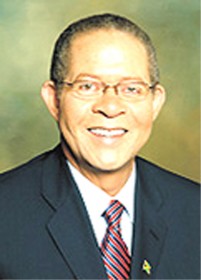-Venezuela to be approached
CARICOM countries are concerned about a proposal from Venezuelan President Hugo Chavez to amend the PetroCaribe arrangement so that beneficiaries pay all, or at least 80%, of the cash upfront and then receive direct loans from Caracas, which would be limited to specific projects approved by the Chavez administration.

Guyana would be among the countries affected. The Associated Press (AP) on Sunday reported Dean Barrow, prime minister of Belize, as criticizing the new proposal that participants in the programme pay up to 80% of their bills within 90 days instead of the current 60%. Barrow says his country does not have the money.
AP also reported Guyana’s Prime Minister Samuel Hinds as saying that his country would also struggle to make payments.
The Jamaica Information Service (JIS) reported yesterday that CARICOM countries, including Jamaica, feeling endangered by the proposed changes to the PetroCaribe agreement, are to approach Venezuela for a compromise soon.
According to the JIS, President Bharrat Jagdeo yesterday made this disclosure when he addressed a special press briefing at Jamaica House. He arrived in Jamaica on Friday for a five-day working visit at the invitation of Prime Minister Bruce Golding.
The briefing followed a meeting of the Special Prime Ministerial Task Force set up by CARICOM to craft appropriate strategies in response to the global economic crisis and its impact on the region.
President Jagdeo, who chairs the committee, said that some of the proposed conditions would present serious challenges to these countries.
“The impending changes in the agreement will present grave difficulties for some of our member states. . . they didn’t have to pay the full cost of the import of oil, immediately. The rest came as a loan to these countries, which they could have used for balance of payment purposes and budgetary support.

This change now will jeopardize that arrangement and, therefore, put some of our countries at a disadvantage when we most need this support,” he is quoted by the JIS as saying.
Jagdeo added that from a regional perspective, CARICOM will have to approach Venezuela, “to say that we would like the impending changes altered or delayed.”
He also noted that particular countries in the eastern Caribbean have faced enormous problems, with a downturn in several sectors and subsequent significant losses in revenue. He pointed out that Antigua had lost 35 per cent of its revenue in the past year.
“They have difficulties paying on a monthly basis, wages and salaries in the public sector, and this problem is not unique to Antigua and Barbuda. Because of the weight of Antigua and Barbuda in the eastern Caribbean currency union, we have to ensure at the task force level that they receive all the support they can get from the bilateral and multilateral agencies,” Jagdeo added, the JIS reported.
Prime Minister Golding, who also spoke at the briefing yesterday, said his government has to stress the fact that the national budget was predicated on the PetroCaribe arrangement.
Golding explained that while he understood some of the difficulties that may warrant changes to the agreement, his country’s current budget, as well as its medium term economic programme, were predicated on the PetroCaribe agreement.
“We have already indicated to the Venezuelans that while we understand some of the difficulties that may warrant a change in the PetroCaribe arrangement. . . not only our current budget, our medium term economic programme was predicated on the PetroCaribe arrangement as it now exists and, therefore, any sudden change would have a significant effect on our external and fiscal accounts,” he is quoted by the JIS as saying.
Golding acknowledged, however, that the genuineness of Venezuela’s friendship towards the Caribbean was unquestionable since the deferred payment arrangement was unmatched.
“To be allowing deferment for 20 years at 2 per cent of as much as 60 per cent of the cost of the product is a significant amount of generosity and, given the difficulty that Venezuela is now facing, it is not difficult to understand why they may need to make some adjustments in those arrangements,” he conceded.
“We want to work with them. I believe we will be able to work out a resolution to this issue,” the Jamaican Prime Minister concluded.
The JIS said further that it was expected that Golding would have been able to discuss the issue with President Chavez on Thursday when the Venezuelan President was expected to pay an official one-day visit to Kingston. However, the visit was postponed after Chavez sustained an injury on Sunday and was ordered to rest for eight days.
Meanwhile, Jamaica’s Minister of Energy James Robertson left the island Monday for Venezuela at the invitation of their Minister of Energy and Petroleum, Rafael Ramirez, to hold further discussions.
Under the 2005 PetroCaribe agreement, with a price range between 50 and 80 dollars per barrel, the percentage financed is 40%; between 80 and 100 dollars, 50%; between 100 and 150 dollars, 60%; and from 150 dollars and over, 70%. The minimum financing considered is 5%, if the barrel reaches 15 dollars. The conditions are: two years of grace, 1% interest, and up to 25 years to pay.
Critics of the agreement had previously warned that by making themselves dependent on easy oil financing from Venezuela, Caribbean countries were making themselves vulnerable to Caracas.
The official PetroCaribe website www.petrocaribe.org had no information yesterday on the proposed changes.
It said however that since the signing of the Petrocaribe Energy Cooperation Agree-ment and up to the first quarter of 2008, cumulative supply of oil and oil products in the framework of the initiative amounted to 59 million barrels. The financed part of oil bill (US$2.007 billion) accounts for a US$921 million saving, estimated at US$14/bbl., for countries that received the supply.




